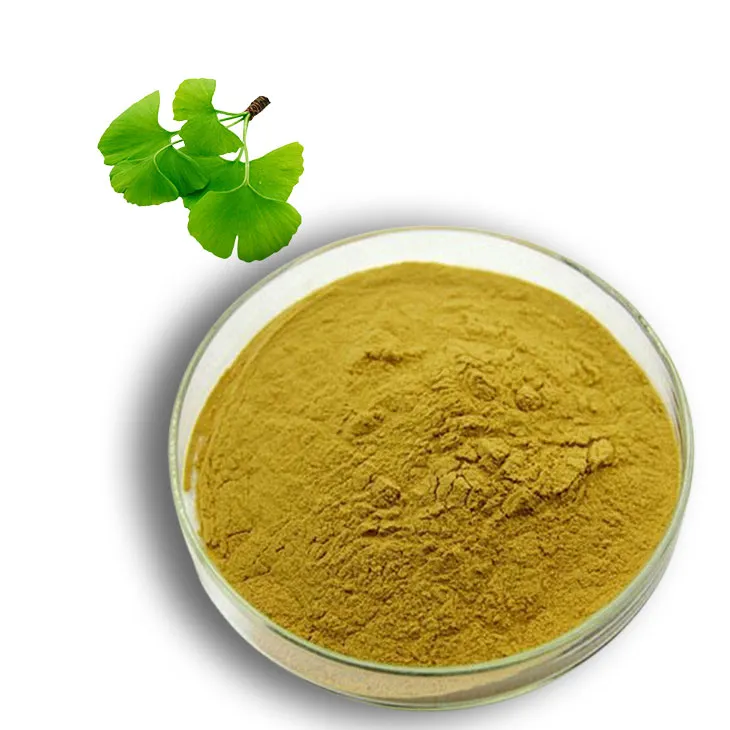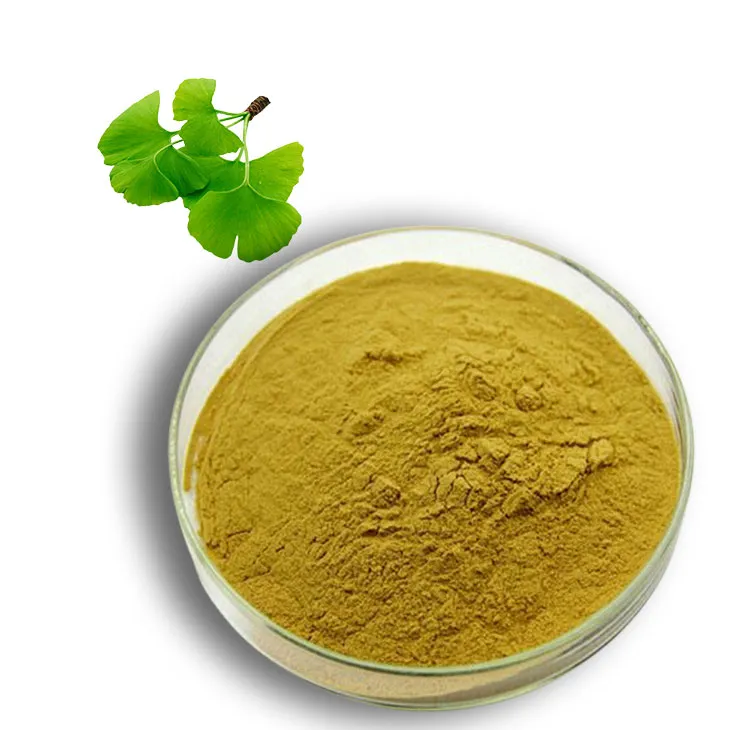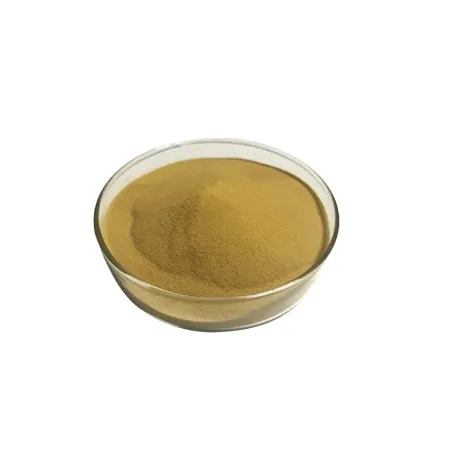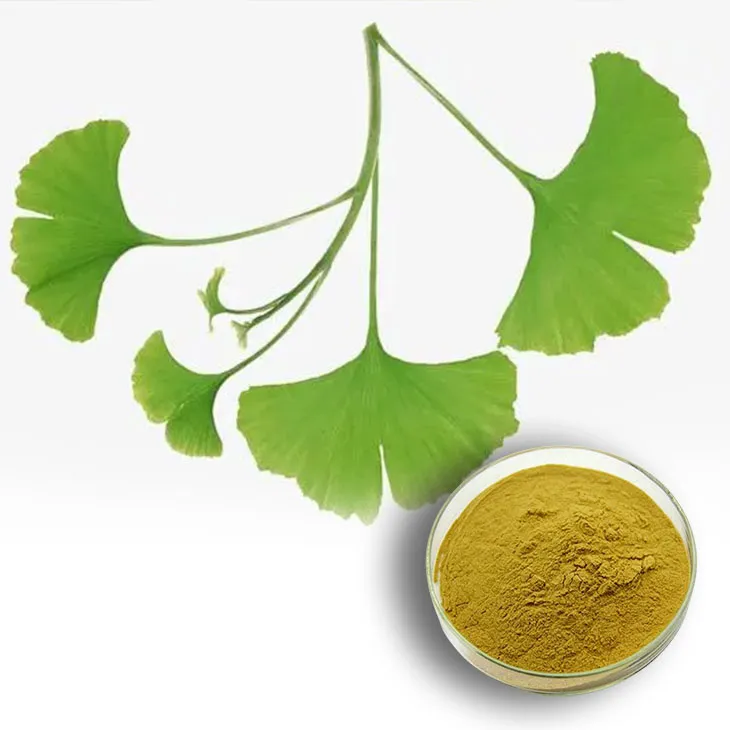- 0086-571-85302990
- sales@greenskybio.com
Ginkgo biloba extract: Should you use it for skin care?
2024-11-12

Introduction
In the world of skincare, the search for effective and natural ingredients is never - ending. One such ingredient that has been drawing attention is Ginkgo biloba extract. Derived from the ancient Ginkgo biloba tree, this extract has been touted for its potential benefits in various aspects of health, and now, skincare. But is it really a "miracle ingredient" for the skin? In this article, we will delve deep into the properties of Ginkgo biloba extract relevant to skincare, including its antioxidant capabilities, anti - inflammatory effects, and its impact on skin texture and appearance. By the end, you should be able to make an informed decision about whether it suits your skin needs.

What is Ginkgo biloba?
Ginkgo biloba, often referred to as the "maidenhair tree," is one of the oldest living tree species on Earth. It has a long history of use in traditional medicine, particularly in Chinese medicine. The tree's leaves are the source of the extract used in skincare and other applications. These leaves contain a variety of bioactive compounds, such as flavonoids and terpenoids, which are believed to be responsible for its potential health and skincare benefits.

Antioxidant Properties
One of the most significant qualities of Ginkgo biloba extract in skincare is its antioxidant power.
Free Radicals and Skin Damage
Our skin is constantly exposed to environmental stressors, such as ultraviolet (UV) radiation, pollution, and cigarette smoke. These factors can generate free radicals in the skin. Free radicals are unstable molecules that can cause damage to skin cells, including DNA damage, lipid peroxidation (which affects the skin's lipid barrier), and the breakdown of collagen and elastin fibers. Collagen and elastin are crucial for maintaining skin's firmness and elasticity. As we age, the natural antioxidant defenses in our skin decline, making it more vulnerable to free - radical - induced damage.
How Ginkgo biloba Extract Fights Free Radicals
The flavonoids and terpenoids in Ginkgo biloba extract act as antioxidants. Antioxidants work by donating an electron to free radicals, thereby neutralizing them and preventing them from causing further damage. By scavenging free radicals, Ginkgo biloba extract can help protect the skin from premature aging, wrinkles, and other signs of environmental damage. For example, in a study, it was found that Ginkgo biloba extract - treated skin cells showed reduced oxidative stress markers compared to untreated cells. This indicates its potential to combat the harmful effects of free radicals on the skin.

Anti - Inflammatory Effects
Inflammation in the skin can be caused by various factors, including allergens, irritants, and microbial infections. Chronic skin inflammation can lead to a range of skin problems, such as acne, eczema, and psoriasis.
Mechanisms of Anti - Inflammatory Action
Ginkgo biloba extract has been shown to possess anti - inflammatory properties. The bioactive compounds in the extract can modulate the body's inflammatory response pathways. They can inhibit the production of pro - inflammatory cytokines, which are small proteins that play a key role in inflammation. By reducing the production of these cytokines, Ginkgo biloba extract can help soothe irritated skin and reduce redness. For instance, in an in - vitro study, Ginkgo biloba extract was found to significantly decrease the levels of certain pro - inflammatory cytokines in skin cells exposed to an inflammatory stimulus.
Benefits for Inflammatory Skin Conditions
For those with acne - prone skin, the anti - inflammatory properties of Ginkgo biloba extract may help reduce the redness and swelling associated with acne lesions. In the case of eczema and psoriasis, where the skin is chronically inflamed, this extract could potentially provide relief by reducing the underlying inflammation. However, it should be noted that while Ginkgo biloba extract may have these beneficial effects, it is not a substitute for medical treatment for severe skin conditions.

Improving Skin Texture
A smooth and even skin texture is often considered a sign of healthy skin. Ginkgo biloba extract may play a role in achieving this.
Stimulation of Collagen Production
As mentioned earlier, collagen is essential for maintaining skin's firmness. The bioactive compounds in Ginkgo biloba extract may stimulate fibroblasts, the cells responsible for collagen production in the skin. By promoting collagen synthesis, the extract can help improve skin elasticity and reduce the appearance of fine lines and wrinkles. In a pre - clinical study, it was observed that treatment with Ginkgo biloba extract led to an increase in collagen production in skin tissue samples.
Exfoliating and Cell Renewal
Ginkgo biloba extract may also aid in skin cell renewal. It can help in the gentle exfoliation of dead skin cells, allowing new, healthy cells to surface. This process can result in a more radiant and youthful - looking complexion. By promoting cell turnover, the extract can also help improve the overall texture of the skin, reducing roughness and dry patches.
Other Potential Benefits
Besides the above - mentioned properties, Ginkgo biloba extract may have other potential benefits for the skin.
Improving Blood Circulation
Good blood circulation is vital for healthy skin. Ginkgo biloba has been known to improve blood circulation in general. In the context of the skin, better blood flow can bring more oxygen and nutrients to the skin cells, promoting their health and vitality. This may contribute to a more glowing complexion and faster wound healing. For example, in some traditional uses, Ginkgo biloba extract was applied topically to promote the healing of minor skin wounds, potentially due to its effect on blood circulation.
Protection Against UV - Induced Damage
While not a substitute for sunscreen, Ginkgo biloba extract may offer some additional protection against UV - induced skin damage. Some studies suggest that the antioxidant and anti - inflammatory properties of the extract can help mitigate the harmful effects of UV radiation on the skin. However, it is crucial to note that sunscreen should still be the primary means of UV protection.
How to Incorporate Ginkgo biloba Extract into Your Skincare Routine
If you decide that Ginkgo biloba extract might be beneficial for your skin, there are several ways to incorporate it into your skincare routine.
Skincare Products Containing Ginkgo biloba Extract
Many skincare products now include Ginkgo biloba extract as an ingredient. These can range from moisturizers and serums to face masks. When choosing a product, it is important to look for ones with a high - quality extract. Check the product label for the concentration of the extract and any other beneficial ingredients it may be combined with. For example, a moisturizer with Ginkgo biloba extract and hyaluronic acid can provide both antioxidant protection and hydration.
DIY Skincare with Ginkgo biloba
For those who prefer a more hands - on approach, it is possible to make your own skincare products using Ginkgo biloba. You can make a simple face mask by grinding dried Ginkgo biloba leaves into a powder and mixing it with a suitable base, such as yogurt or honey. However, when making DIY skincare products, it is essential to ensure proper hygiene and safety, as homemade products may not have the same preservative systems as commercial ones.
Precautions and Considerations
While Ginkgo biloba extract has many potential benefits for the skin, there are also some precautions to keep in mind.
Allergic Reactions
Some individuals may be allergic to Ginkgo biloba. Before using any product containing the extract, it is advisable to do a patch test on a small area of skin, such as the inside of the wrist. Wait for 24 - 48 hours to see if there is any redness, itching, or swelling. If there are any adverse reactions, do not use the product.
Interactions with Medications
Ginkgo biloba may interact with certain medications. For example, it can increase the risk of bleeding when taken with blood - thinning medications. If you are taking any medications, it is important to consult your doctor or pharmacist before using Ginkgo biloba - based skincare products, especially if the product is likely to be absorbed into the bloodstream.
Conclusion
Ginkgo biloba extract has a number of properties that make it a potentially valuable ingredient in skincare. Its antioxidant, anti - inflammatory, and skin - texture - improving effects, along with other potential benefits, are appealing for those looking to enhance their skin health. However, it is not a one - size - fits - all solution, and individual factors such as allergies and potential drug interactions need to be considered. By understanding the science behind Ginkgo biloba extract and how it can be incorporated into your skincare routine, you can make an informed decision about whether it is right for your skin. Whether you choose to use products containing this extract or explore DIY options, always prioritize safety and consult a healthcare professional if you have any concerns.
FAQ:
Question 1: What is ginkgo biloba extract?
Ginkgo biloba extract is derived from the ginkgo biloba tree. It contains various bioactive compounds, such as flavonoids and terpenoids, which are thought to have beneficial effects on the skin.
Question 2: How can ginkgo biloba extract protect skin from environmental damage?
It has antioxidant properties due to its flavonoid content. These antioxidants can neutralize free radicals that are generated by environmental factors like UV radiation, pollution, and toxins. By doing so, it helps prevent oxidative stress on the skin, which can lead to premature aging, wrinkles, and dullness.
Question 3: What influence does ginkgo biloba extract have on skin texture?
It may improve skin texture in several ways. Firstly, by promoting better blood circulation in the skin, it can deliver more nutrients and oxygen to the skin cells. This can enhance the skin's overall health and make it look more plump and smooth. Secondly, it might stimulate collagen production, which is important for maintaining skin firmness and elasticity, thus improving the texture.
Question 4: Is ginkgo biloba extract suitable for all skin types?
While it generally has potential benefits for many skin types, it may not be suitable for everyone. For example, some people with extremely sensitive skin may experience irritation. It's always advisable to do a patch test first. For normal, dry, and combination skin types, it can often be beneficial in terms of providing antioxidant protection and improving skin texture. However, those with oily skin should also be cautious as it may potentially clog pores, although this is not always the case.
Question 5: How should ginkgo biloba extract be used in skincare?
It can be found in various skincare products, such as creams, serums, and masks. When using products containing ginkgo biloba extract, follow the instructions on the product label. Typically, it is applied to clean, dry skin. For best results, it may be incorporated into a regular skincare routine, used in the morning to protect against environmental damage throughout the day and in the evening to help with skin repair.
Related literature
- The Role of Ginkgo Biloba in Skin Health"
- "Ginkgo Biloba Extract: Skin - Protective and Rejuvenating Properties"
- "Beneficial Effects of Ginkgo Biloba on Skin Aging"
- ▶ Hesperidin
- ▶ citrus bioflavonoids
- ▶ plant extract
- ▶ lycopene
- ▶ Diosmin
- ▶ Grape seed extract
- ▶ Sea buckthorn Juice Powder
- ▶ Beetroot powder
- ▶ Hops Extract
- ▶ Artichoke Extract
- ▶ Reishi mushroom extract
- ▶ Astaxanthin
- ▶ Green Tea Extract
- ▶ Curcumin Extract
- ▶ Horse Chestnut Extract
- ▶ Other Problems
- ▶ Boswellia Serrata Extract
- ▶ Resveratrol Extract
- ▶ Marigold Extract
- ▶ Grape Leaf Extract
- ▶ blog3
- ▶ blog4
- ▶ blog5
-
Organic Tongkat Ali extract powder factory.
2024-11-12
-
How to make powder with ashwagandha extract.
2024-11-12
-
Rosehip extract manufacturers from China.
2024-11-12
-
The best cat's claw extract in nature.
2024-11-12
-
Chinese Dandelion Leaf Extract Suppliers.
2024-11-12
-
Cocoa Extract
2024-11-12
-
Black Rice Extract
2024-11-12
-
Purple Sweet Potato Extract
2024-11-12
-
Black Garlic Extract
2024-11-12
-
Eyebright Extract
2024-11-12
-
Buckthorn bark extract
2024-11-12
-
Thunder God Vine Extract
2024-11-12
-
Shikonin
2024-11-12
-
Panax Ginseng Leaf Extract
2024-11-12
-
Aminolevulinic acid
2024-11-12





















